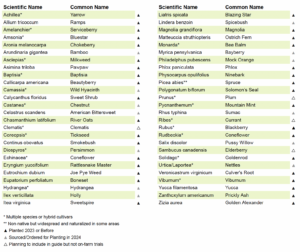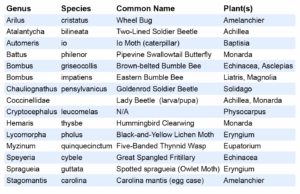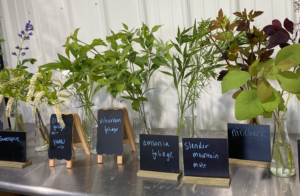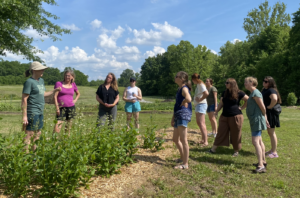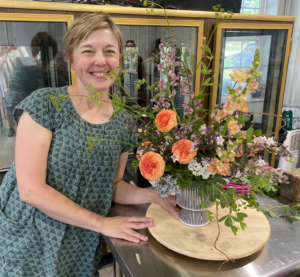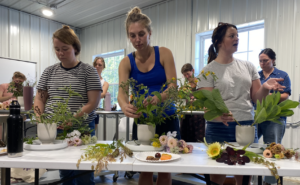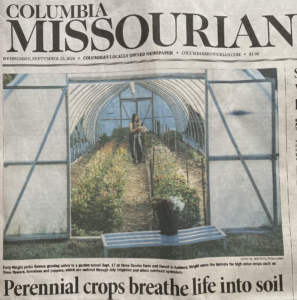Progress report for FNC23-1400
Project Information
Emily Wright and Paul Weber, Three Creeks Farm + Forest:
Three Creeks is a highly diversified operation in the Missouri River Hills. We grow and harvest vegetables, herbs, flowers and wild edibles. Our produce is sold directly to the local community, including chefs, grocery stores and floral designers. All of our food and flowers are grown without the use of synthetic pesticides or fertilizers. We have been farming full-time since 2015.
Emily Wright, farmer and co-owner of Three Creeks Farm, has a bachelor's degree in Environmental Science from Colorado College and also served as the school's first sustainability manager. She earned a master's degree in Environmental Management from the Yale School of the Environment, specializing in Sustainable Land Use. Emily will be the project coordinator and primary author of the perennial guide.
Paul Weber, farmer and co-owner of Three Creeks Farm, has dual bachelor’s degrees in Journalism and German Language from the University of Missouri. He worked on multiple farms in the U.S. and abroad prior to co-founding Three Creeks Farm in 2014. Paul runs the farm crew at Three Creeks and brings unique knowledge to this project from his time working with the Native Plants Program at Lincoln University Extension in Jefferson City, MO.
________________________________________________________________________________________________________________________
Greg and Joan Dyer, Cultivate Co., LLC:
Cultivate Co. is an apple orchard and cut flower farm in Boone County, MO. Our young orchard has 450 apple trees with over 100 varieties, 17 pear trees and 20 peach trees. Our cut flower business sells over 50 varieties of cut flowers from April-October. Our sales outlets include a seasonal, weekly on-farm market, workshops, several boutique shops, wholesale to local florists, and other on-farm bouquets and bucket sales for events. We are very conscious with our farming choices and choose to not use any harmful chemicals in our practices.
Greg Dyer, farmer and co-owner of Cultivate Co., has a bachelor’s degree in Liberal Arts from the University of Missouri and a Master’s Degree in Educational Leadership from Colorado State University. Since 2018, Greg has been active in the management of the infrastructure on the farm, along with management of the apple orchard.
Joan Dyer, farmer and co-owner of Cultivate Co., has a bachelor’s degree in Human Environmental Sciences and a Master’s Degree in Personal Financial Planning. Joan has managed the cut flower operation on the farm since 2019.
Our project aims to assess the role perennial plantings can play in specialty food, floral and agroforestry production systems. We have experienced a growing demand for culinary and floral products that are seasonal and unique to our region. These crops are unavailable through traditional market channels like wholesalers and distributors. Our area is a center for agroforestry research related to things such as chestnuts, elderberries, and pawpaws, but there are many potential native perennial plants or native cultivars that are largely unexplored as candidates for integration into specialty crop systems. As we’ve worked to expand our offerings, we’ve searched through catalogs, forums, books, and our own landscapes to identify 50+ perennial species native to our region that we believe could fit well into our operations. These plants have both ecological value for wildlife and product value for our markets. We have identified sources for the plants, but we are lacking details related to proven selections and production systems - including seasonal availability, post-harvest handling, and pricing. With this project, we plan to document our process of integrating native perennials on our farms so that it can serve as a resource for the many growers seeking to do the same.
Update 01/31/2025 : Our perennial trials and final report deadline have been extended to December of 2025. Our project involves trialing and collecting data for a variety of native perennial species as specialty crops. Many of these are woody species, which took some time to source and plant. And in the summer of 2024, many of them were hit pretty hard by the cicadas here at our farms in Mid-Missouri! One more growing season will allow us to collect more data and for our final report and guide, so stay tuned!
Solution
We plan to establish perennial plantings that will increase biodiversity and revenue streams on our farm. These plants have both product value (flowers, fruits, and foliage) for our markets and ecological value. Perennial crops can reduce soil erosion, conserve water, store carbon, and contribute to a more ecologically resilient working landscape. These plantings will attract beneficial insects (pollinators and predators) to our farm ecosystem, and in some cases they are also designed to function as windbreaks and buffers for water runoff during extreme weather events.
Our current list of candidates for integration into our production systems includes 50+ species of perennial natives and native cultivars. (List attached below.) Cultivate Co. is committed to trialing and documenting 29 different species at their farm, and Three Creeks Farm plans to trial and document 42 species, with close to 2000 individual plants installed at both farms combined. There is some overlap in species selection between the two farms, but we see that as a positive for our collaboration and trials.
Trial and documentation will include:
- Site prep, planting, mulching, and irrigation at both locations
- Temporary fencing to support plant establishment at Cultivate Co.
- Maintenance, monitoring and documentation
- Weeding
- Scouting for beneficial insects and pollinators and photographing for records and identification
- Recording harvest season, duration, and yields
- Tracking sales and price points by species
- Photographing the salable product and/or its use in floral designs or culinary offerings
We plan to organize two farmer/florist workshops in 2024. The target audience will be flower farmers interested in adding perennials to their crop systems, along with local florists who may want to use those products in their designs. These workshops will feature a local designer familiar with sourcing and using local flowers and foliage. The workshops are intended to be educational, but also serve as a networking opportunity. Cultivate Co. and Three Creeks Farm are currently looking for ways to grow the local wholesale supply and help other growers find markets for their crops.
On the culinary side, Three Creeks Farm will market perennial options directly to our list of wholesale restaurant customers, which includes approximately twenty local chefs. In the past, many of our offerings for them have been foraged, which can be time-consuming, inefficient, and if not done properly, unsustainable. We hope that by intentionally growing these crops in close proximity, we can address some of those concerns.
Finally, we hope to share our experience via a digital guide (in website and pdf formats) that will contain the information that growers are seeking when trying to determine whether to add perennial crops to their systems. This will include details such as specific species, sourcing, seasonal availability, harvest/post-harvest handling, and floral or culinary uses. We need support to turn the extensive research we've done into a resource for fellow farmers.
Objectives
- Identify native perennials and native cultivars for use in specialty crop production (floral and culinary)
- Trial and document production for 50+ species on-farm
- Track market demand, sales and uses for perennial native specialty crops
- Network with fellow growers through workshops
- Share findings through a digital guides (website and pdf), workshops, website and social media, and conference presentations.
Cooperators
- - Producer
- - Producer
- - Producer
- - Producer
Research
In year one of our grant project, we were primarily focused on refining our species list, sourcing trial plants, and getting everything in the ground. The image below shows our revised species list, along with planting progress.
We were able to source and plant 40 different species of perennial plants in 2023. Close to 1300 plants went in on our farms, at sizes ranging from small plugs up to three gallon containers. The remaining plants have been sourced and ordered and will arrive at our farms for planting in early spring 2024.
The bulk of our data collection and analysis will occur in the 2024 season ahead, but we were able to collect some relevant information in the first year of our project. Several of the species we planted for floral uses yielded marketable harvests in the first year, including Achillea (from #1 Grade bare root), Chasmanthium (from 4.5” pots), Eryngium (from one gallon pots), Pycnanthemum (from one gallon pots), and Solidago (from 50 count plugs). In total, we harvested and sold 840 stems of perennial flowers or foliage. Of the plants listed, the yarrow was by far the most productive, and also had the highest demand from floral designers we work with. It stands out as the one plant in our trials that easily earns a return on the investment in the first year of planting.
In addition to collecting sales data, we created a system for recording insect species. We scout for insects while in the field, snap a photo, add it to a shared folder, and then identify and document the insects using a variety of tools, including the “Picture Insect” app, regional insect ID groups on social media, and online databases. The list below is what we recorded while developing our system in 2023.
Educational & Outreach Activities
Participation summary:
During the course of the 2023 season, we hosted several farm tours that highlighted our SARE research project.
These tour groups included:
- University of Missouri Sustainable Agriculture Professors and Students (Three Creeks Farm)
- Columbia Center for Urban Agriculture Market Garden Apprentices and Employees (Three Creeks Farm)
- Administrators from the Missouri Flower Exchange, a wholesale flower farming collective serving the Springfield and Mid-Missouri areas (Three Creeks Farm and Cultivate Co.)
- Foster Care Families (Free U-Pick Event at Cultivate Co.)
- Floral Design Workshop Attendees (Cultivate Co.)
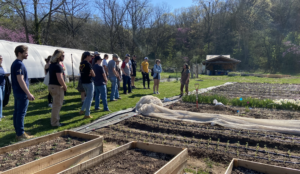
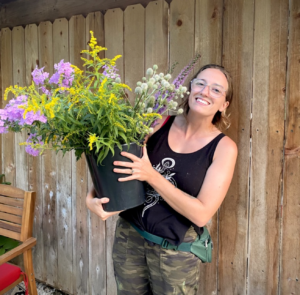
In addition to hosting on-farm educational tours, Three Creeks Farm donated the harvest from some of the trial plants (Eryngium, Liatris, Phlox, Rudbeckia, and Solidago) to Adrienne Luther Johnson, a Mid-Missouri artist who is known for her vibrant mural installations throughout Columbia, MO. She used the native plants for an educational project with a local school, Locust Street Expressive Arts Elementary. Students there learned about Missouri native plants and then incorporated their botanical lessons into a large-format flower mural on site.
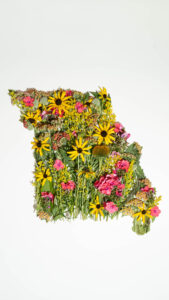
We also shared an announcement and update about our project via social media - Facebook and Instagram. The post had widespread engagement, reaching over 2000 accounts across the two platforms.
In a separate outreach post via social media, Cultivate Co. partnered with Kara Potter Studio to create a stop-motion video using native flowers from our SARE project, including Achillea, Chasmanthium, Echinacea, Eryngium, Phlox, Rudbeckia, and Solidago. This animated reel reached closed to 900 accounts on Instagram.
In 2024, we hosted two on-farm workshops. Flower farmers, floral designers, and home gardeners were invited to learn about the species and varieties that we are trialing as part of this project. As part of each workshop, Emily Hansum of Sugarberry Blooms led a design demonstration using seasonal native flowers and foliage (mixed with some annual blooms from our farms as well), and we ended each workshop with a field tour at Cultivate Co.
We advertised these through our grower and designer networks, and through social media.
The flier from our August Event is viewable here: Perennial Floral Workshop (4)
Three Creeks Farm and Forest was also featured in a regional radio/newspaper series on Missouri agriculture called "The Next Harvest" by Jana Rose Schleis. The story highlighted the work we're doing to integrate perennial crops into our production system. The story is available online.
It was also featured on the front page of our local newspaper!
Learning Outcomes
Some of the species included in our project were already planted on our farms, or familiar to us from prior research. However, as we worked to refine our list, we learned about many native species that were completely new to us! We are genuinely excited about growing and harvesting the 50+ species we’ve included in our project, but we recognize that it is not an exhaustive list. We expect to learn about even more amazing plants as we engage with our community around this topic.
